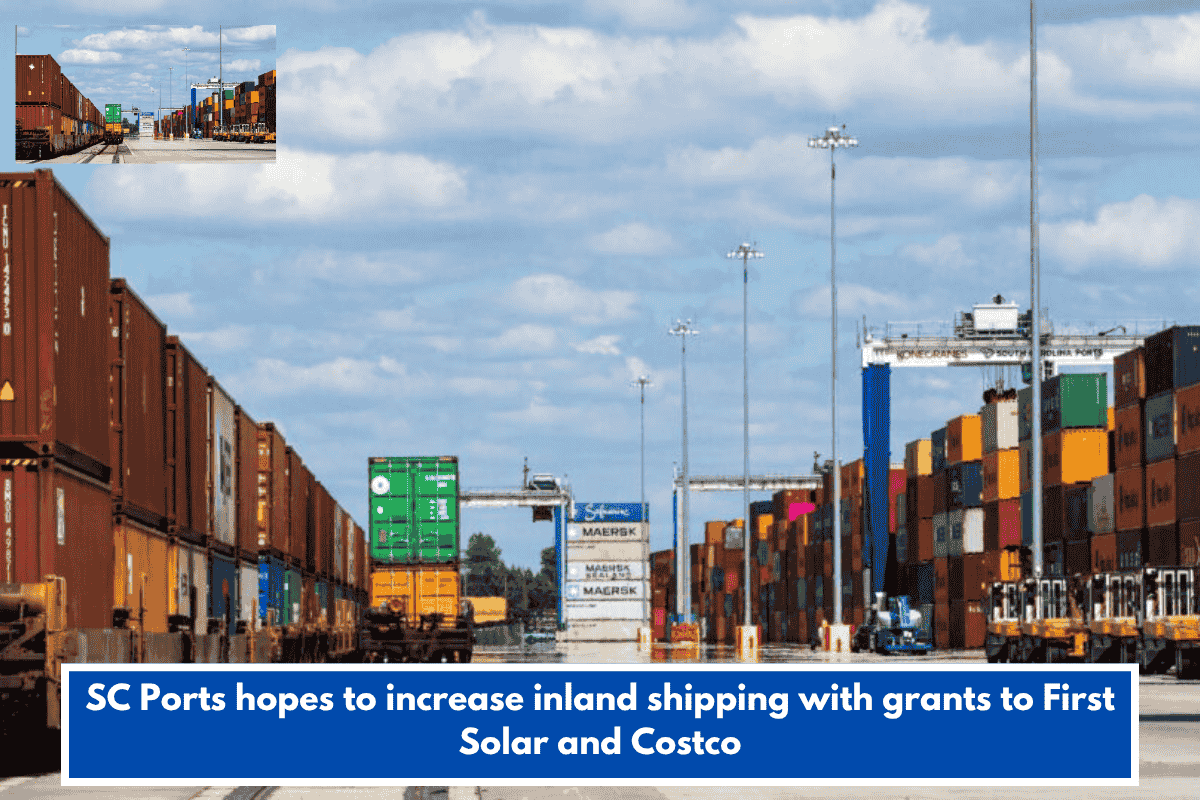The South Carolina State Ports Authority granted $1.5 million in subsidies to two enterprises that intend to expand cargo operations at the Inland Port Greer site. (Photo courtesy of the South Carolina State Ports Authority).
MOUNT PLEASANT — Micah Mallace is following through on his commitment to fast prioritize projects that will increase cargo at the Port of Charleston.
The S.C. State Ports Authority’s board of directors approved two $1.5 million grants on Tuesday to assist two enterprises that would rely on Inland Port Greer to distribute their products. The grants will help fund public infrastructure projects such as highways.
The funds are consistent with an idea Mallace outlined at his first State of the Port speech late last month, which states that “capital investments will be tied exclusively to revenue-generating opportunities.”
Mallace, who took over as president and CEO of the authority on October 13, described the need for immediate freight development as one of the marine agency’s most pressing concerns.
“SC Ports works collaboratively with our partners at the S.C. Department of Commerce and our state leaders to attract businesses that support growth and have a meaningful economic impact on our state,” Malice stated in a letter to the editor. “These incentive grants are a part of SC Ports’ commitment to ensuring that port-dependent businesses have the necessary infrastructure in place to move their goods from the Port of Charleston and beyond.”
The first $1 million award will help retailer Costco build a 541,000-square-foot distribution hub in Rock Hill. The plant, which is projected to be operational by mid-2027, will supply imports and other products to around 20 Costco shops in the Carolinas and Georgia.
The $240.3 million distribution center, codenamed Project Sample, is planned to employ 165 people at an average cost of $27 per hour. In addition to the port’s funding, Costco is requesting approximately $30 million in state and local tax credits for the project.
The second grant, worth $500,000, will allow solar panel manufacturer First Solar to expand its Gaffney production facility by 1.3 million square feet and establish a 560,000-square-foot distribution center.
First Solar, a longtime Inland Port Greer customer, estimates its $330 million investment to create more than 600 jobs by mid-2026, with beginning earnings of $21.60 per hour.
The expansion, formerly known as Project Oranges, will bring the final production process for First Solar’s modules to the United States from abroad. First Solar is also looking for state and municipal tax breaks for the project, which is located at the Cherokee Commerce Center off Interstate 85.
The two projects will add an undefined number of cargo boxes to Greer’s inland port, which has processed approximately 69,000 containers since the current fiscal year began on July 1. That is around 2.2% greater than the same period last year.
Overall, the number of cargo containers of all sizes at the Port of Charleston increased by approximately 1.1% this fiscal year. However, October totals were about 1% lower than the same period last year.
“Recent reports continue to show weakness across the market,” stated Byron Miller, the authority’s chief commercial officer. “Typically, October is one of the strongest months of the year – it’s a peak month toward the holidays.”
Miller highlighted that several U.S. ports are witnessing double-digit drops in imports, and that the lower October data are likely due to merchants purchasing cargo ahead of duties.
“We saw a lot of early shipping to avoid some of the trade policy impacts,” according to him.
The National Retail Federation predicts lower-than-normal imports for the rest of the year, as most holiday product is already in shops or warehouses.
“We’ve spent most of the year worried about the impact of tariffs on both inflation and the supply chain, but the holiday season is here, and mitigation efforts appear to have paid off,” Jonathan Gold, the federation’s vice president for supply chain and customs policy, said in a written statement.
“Store shelves are well-stocked and the effect on prices has been minimized,” claims Gold, “largely thanks to retailers taking steps like frontloading imports during times of low or delayed tariff increases or absorbing the costs themselves.”














